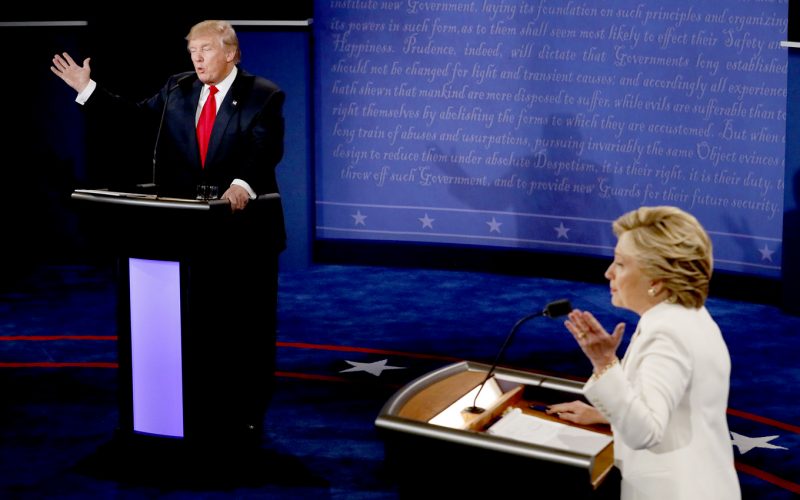
Democratic presidential nominee Hillary Clinton and Republican presidential nominee Donald Trump debate during the third presidential debate at UNLV in Las Vegas, Wednesday, Oct. 19, 2016. (Mark Ralston/Pool via AP)
Donald Trump waited one day before delivering the punch line to his sad joke, “I will keep you in suspense” about respecting the election results. “Unless I win,” he said to great applause from his supporters. One would expect no less from an exceptionally arrogant man who cannot accept defeat. (His son, Trump Jr., is a chip off the old block. He is quoted as saying that the White House would be a “step down” for his father—a classic “sour grapes” line.)
By taking this unprecedented position, Trump ensured headlines, and probably sent a few more Republican candidates down the tubes. He clearly doesn’t care, since only his “voice” counts, not the party’s. He will become another in a long list of dictators-in-waiting.
But I was also struck by what the candidates didn’t say in the third debate. Here are 10 items I (and, I imagine, many of you) would have liked to have heard discussed:
1. Climate change – Once again, barely a word about the world’s number-one long-term security issue.
2. Nuclear weapons – a discussion of next steps toward genuine arms control, meaning a minimum force (if not nuclear abolition), a halt to further refinement of nuclear weapons, and a new agreement with Russia on substantial weapons reductions.
3. Mosul– Rather than debate how Mosul is being attacked, talk about the aftermath. There won’t be a Mosul, or a Raqqa, once ISIS is driven out. As large-scale fighting in Iraq, Afghanistan, and Syria has already shown, there is nothing left standing when it is over. The unspoken problem then becomes providing for refugees and the sick, wounded, and elderly survivors who cannot leave.
4. Syria –Deeper U.S. involvement, such as by announcing a no-fly zone that Hillary Clinton favors, won’t save lives in Aleppo or anywhere else, but will almost certainly expand the U.S. role, produce more civilian casualties, and bring it closer to a confrontation with Russia.
5. Russia –A new Cold War is in nobody’s best interest. The contrast between Trump’s know-nothingism and Clinton’s cold warriorism leaves out the possibility of a creative diplomatic approach to Russia. (Consider that the U.S. is now charging Russia with violating the 1987 Intermediate-Range Nuclear Forces Treaty, negotiated by Reagan and Gorbachev, by moving ahead on a ground-based cruise missile program. This comes on the heels of Russia’s withdrawal from a plutonium accord. Thus, the direction of U.S.-Russia relations remains decidedly negative, hostile, and thus dangerous.)
6. China–U.S. policy is a mix of multilevel engagement and muted conflict. While the U.S. maintains its “pivot” to Asia, China is continuing its buildup in the disputed South China Sea islands and is courting the Philippines, whose new president Rodrigo Duterte is talking while in Beijing of “separation” from the U.S. Should U.S. policy toward China change in response? Should Washington call Duterte’s bluff?
7. Energy – Candidates always talk about our needing more energy. But the future points to reliance on renewable sources, which are getting cheaper and are clearly more dependable than fossil fuels and nuclear power.
8. Relations with Israel–Will the U.S. continue to give Israel what it wants, with occasional mild (and meaningless) criticism, or will it finally base policy on principles on social justice, self-determination, and protection of human rights?
9. Income inequality – It’s fine to talk about creating jobs, but growing income inequality in America means still more for the one percent, less for the middle and lower income classes, and thus poor-paying jobs.
10. Military spending—Where will money for increased federal spending on social needs come from? We can talk about higher taxes on the wealthy or cuts in Social Security, but axing military spending remains the taboo subject.
Presidential debates should be learning opportunities. There was a time when they actually were. These last three debates were shouting matches—undignified, personality-based, extremely limited in information or thoughtfulness. America’s “noble experiment” suffered greatly from the exercise.



